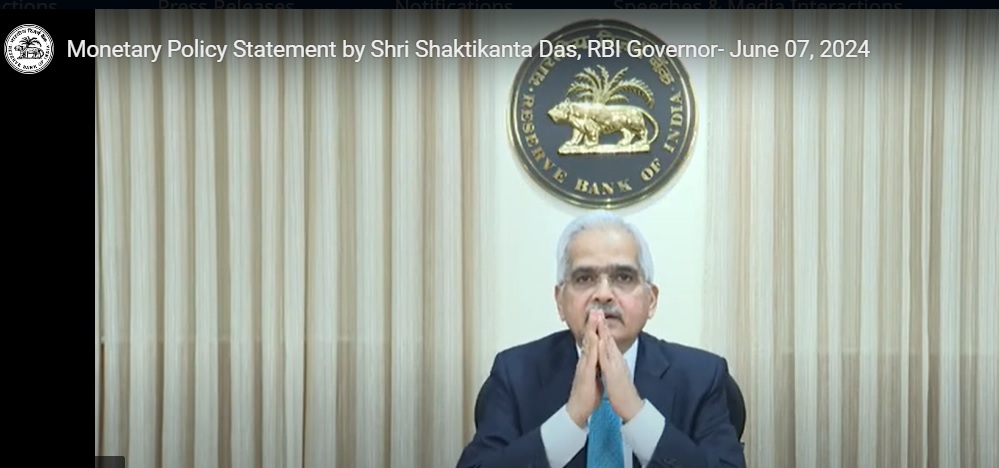RBI@100: Use of AI / ML In Leveraging RegTech/SupTech
Aspirational Goals in a Multi-Year Time Frame
 Shaktikanta Das, Governor, the Reserve Bank of India
Shaktikanta Das, Governor, the Reserve Bank of India
FinTech BizNews Service
Mumbai, June 7, 2024: As the Reserve Bank approaches its centenary year, RBI@100, it will gear up even more to remain future-ready for India’s fast growing economy. It will take steps to enhance India’s global footprint. “For our journey during the next decade, we have drawn up strategies consisting of policy actions towards positioning the Reserve Bank as a model central bank of the global south. The agenda for the run-up to RBI@100 is documented. I urge the keen observers of the Indian economy and financial system to take a close look at these action plans. This is not a static document as we are living in a dynamic world. Our endeavour will be to continually update it as may be required, said Shaktikanta Das, Governor, the Reserve Bank of India, today following MPC meeting. The Monetary Policy Committee (MPC) met on 5th, 6th and 7th June 2024.
The agenda, revealed by Mr. Das, is as follows:
1. Monetary Policy and Liquidity Management
• Positioning the Reserve Bank as Leader of the Global South
• Review of Monetary Policy Framework to address:
- Balancing price stability and economic growth from an Emerging Market Economy (EME) perspective;
- Refinements in monetary policy communication; and
- Spillovers to EMEs from private and public debt overhang in systemically important economies.
2. Globalisation of India’s Financial Sector
• Financial Sector Reforms related to:
- Expanding banking domestically in consonance with national growth;
- Positioning 3-5 Indian banks among top 100 global banks in terms of size and operations;
- Deepening and modernisation of financial markets/institutions/infrastructure; and
- Supporting International Financial Services Centres Authority (IFSCA) to make GIFT City a leading international financial centre.
3. Making Reserve Bank’s Supervision a Global Model
• Risk Focused Supervision:
- Supervisory culture for effective risk discovery; and
- Ensuring an appropriate compliance culture at Supervised Entities (SEs).
• Building ‘Through the Cycle’ Risk Assessment Framework by continuous Horizon Scanning and Holistic Risk Assessment;
• Customer-centric supervision: Improving the conduct of SEs to protect and promote customers’ interests through appropriate supervisory focus;
• Effective Corrective Actions: Focus on prudent supervisory judgement and assessing supervisory effectiveness; and
• Creating a Data Analytics Universe.
4. Deepening and Universalisation of Digital Payment Systems – Domestically and Globally
- Internationalisation of India’s Payment Systems – UPI/RTGS/NEFT;
- Participation in Payment Systems Linkage Projects across countries – bilateral & multilateral;
- Increasing the domestic usage of digital payments – Har Payment Digital; and
- Phased implementation of Central Bank Digital Currency (e - Rupee).
5. Deepening Financial Inclusion
- Focusing on Accessibility, Availability and Quality of financial services to all sections of the society.
6. Expanding Credit Availability
- Strengthen data collection;
- Comprehensive Credit Information Repository (CCIR) for supporting credit needs and monitoring;
- Unified Loan Interface (ULI); and
- Review of priority sector guidelines to proactively address emerging needs.
7. Capital Account Liberalisation and Internationalisation of the Indian Rupee (INR)
- Enabling availability of INR to non-residents for facilitating cross-border transactions in INR;
- Enhancing accessibility of INR accounts to Persons Resident Outside India (PROIs);
- Adopting a calibrated approach towards interest-bearing Non-Resident Deposits; and
- Promoting Indian Multi-national Corporations (MNCs) and Indian global brands through overseas investments.
8. Dealing with Climate Change
- Regulatory/Supervisory framework for addressing challenges arising from climate change;
- Finalising guidance for Regulated Entities (REs) to stress test their asset portfolio to assess impact of climate change;
- Macro stress testing the impact of climate change on REs from a financial stability perspective;
- Strengthening payment systems’ resilience to climate risks;
- Developing climate risk disclosure norms for REs;
- Providing inputs to government for finalising taxonomy on climate risks; and
- Publishing a risk management framework for managing climate-related financial risks.
9. Adoption of Artificial Intelligence/Machine Learning (AI/ML) in the Reserve Bank
• Articulation of an AI Policy for the Bank.
• Use of AI / ML in:
- Leveraging RegTech/SupTech for effective supervision;
- Management of Cyber Risk; and
- Forecasting, Nowcasting and Surveys.
10. Financial Sector Cloud Infrastructure
- Indian Financial Cloud: Establish a cost-effective cloud facility for the financial sector to enhance the security, integrity and privacy of financial sector data while facilitating scalability and business continuity; and
- Internal AI Cloud: Develop an enterprise-wide platform with AI/ML capabilities to enhance operational efficiency, productivity, data analytics, risk management, decision making and customer experience.
11. Transformational Shifts in Data Collection, Processing and Storage
- Developing Data Mesh with REs;
- Cloud Quantum Computing Services for Analytics; and
- Geo-tagging for supporting high frequency data analysis.
12. Safeguarding Users Against Payment Frauds
- Widening and deepening consumer awareness;
- Making payment systems more safe and secure; and
- Identifying and implementing solutions for proactive prevention and quick redressal of frauds.
13. Developing a Secure Global Financial Messaging Hub
- Exporting financial networks and messaging systems as alternative platforms.
14. Making Reserve Bank’s Human Resources and Infrastructure Future Ready.
